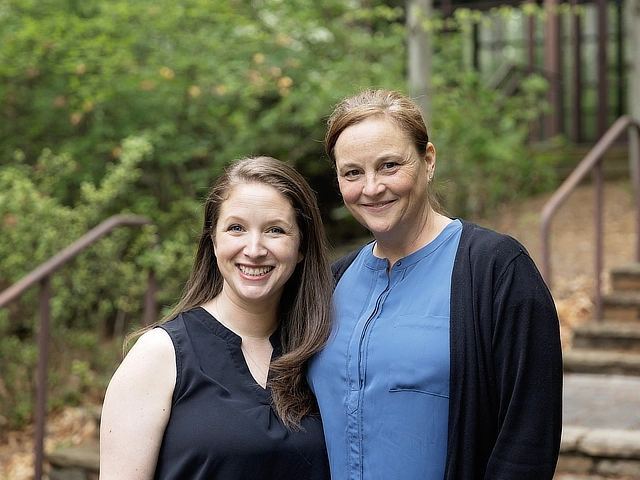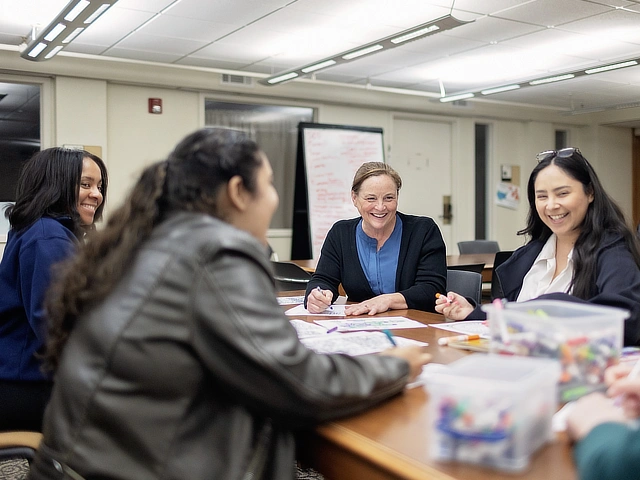
Although the month of May is significant to bringing awareness to mental health initiatives, several Samford University graduate programs implement wellness programs to encourage and uplift students throughout the academic year.
For health care professionals, mental well-being is crucial for future careers, as it directly impacts an individual’s ability to provide high-quality care, make sound decisions and maintain empathy for patients. Chronic stress and burnout can lead to errors, reduced productivity and lower job satisfaction, ultimately affecting patient outcomes. And, it is no secret that the legal profession has a higher rate of mental health issues in comparison to other professions.
Heather Hallman, assistant professor of physician assistant (PA) studies in the School of Health Professions, has integrated diverse programs to encourage wellness activities amongst her PA students. To relieve stress in a sustainable way, Hallman said she and the students identified the need to provide time and space for a breather. They began by simply going outside and eating lunch by the pond, then they added watercolor painting and puzzles that the students could do to disconnect during breaks.

Hallman said, “Prioritizing mental health fosters resilience, enhances communication skills, and supports a sustainable work-life balance, ensuring that health care professionals remain compassionate, effective and committed to their roles throughout their careers. I felt that my job was to provide the time, space and resources for them to take care of themselves as well as let them know not only was it okay to take a break, but it was also encouraged.”
In Cumberland School of Law, Lynn Hogewood, assistant dean of Academic and Bar Success, also understands the critical role mental health plays in academic success and long-term career satisfaction. Over the past few years, Hogewood, who is a certified life coach, has led open conversations and discussions about mental health, emphasizing its importance for law students. Beginning at first-year orientation, they are introduced to programs such as Law Student Mental Health Week in October, Well-Being Week in Law in May and Wellness Wednesdays. Hogewood also emphasizes similar programming offered around the state by the Alabama State Bar and other organizations.
Studies show that deep cognition and enjoyment of learning happens with better mental health. The American Bar Association (ABA) completed an intensive study and released a report in 2017 that made suggestions for lawyers and law schools to promote well-being in six different prongs: social, spiritual, emotional, physical, occupational and intellectual. The ABA has mandated a standard that law schools offer opportunities to promote mental health and well-being to law students, and most Bar associations across the country have lawyer assistance programs that provide a wide variety of resources to lawyers. Hogewood said, “Through the rules of professionalism, lawyers are to practice at the best of their ability, and if they are not taking care of themselves, they may not be practicing to the best of their abilities.”
Throughout Samford’s campus, there are a variety of resources that students can take advantage of such as Samford Counseling Services and the CARE Team.

When reflecting on mental health initiatives at Samford, Hallman believes that breaking the stigma of mental health starts with the faculty and staff. She said, “Students learn as much, if not more, from our actions outside the classroom as they do from our teachings inside it. It is incredibly important for them to see us setting healthy boundaries, prioritizing our own mental health, and maintaining a healthy work-life balance. This begins with reflection and introspection on our own lives. Additionally, it is powerful for students to know that we understand what they are going through. By showing that we, too, are human and may face similar struggles, we can foster a more open and supportive environment for discussing and addressing mental health.”
To battle mental health struggles that many students face, Hogewood emphasized the impact of vulnerability. She said, “I believe we can simply have conversations. We can share our own stories with a bit of vulnerability and open our hearts and minds that everyone has a different experience in life. That does not mean that anyone is stronger or weaker or better or worse. It just means that we have experiences and go through those experiences differently. It’s a beautiful tapestry of humanity. God created us all so very uniquely and set our paths out so very differently—we should be celebrating that—recognizing that mental health is important to all of us if it is significant for one or any of us. To me, that shows the love of God.”
